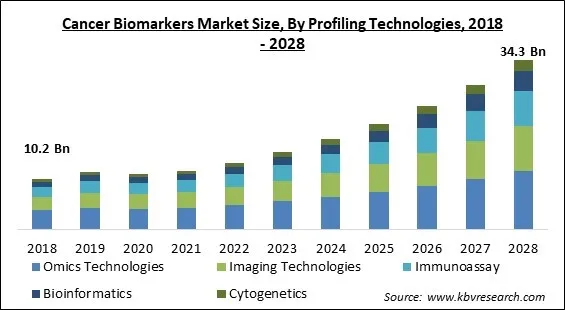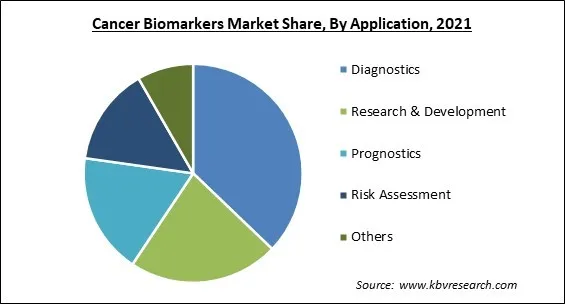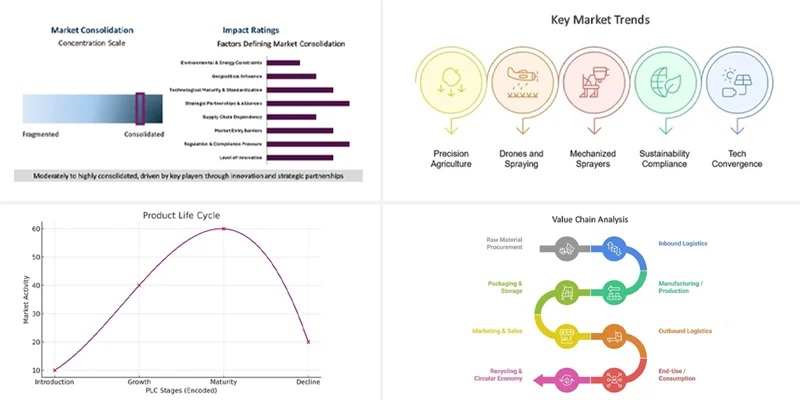The Global Cancer Biomarkers Market size is expected to reach $34.3 billion by 2028, rising at a Market growth of 16.8% CAGR during the forecast period.
Cancer biomarkers are chemicals or molecules that can be traced and indicate the presence of malignant cells in the body. Cancer prevention involves diagnosing and proteins evaluating multiple cancer biomarkers using various diagnostic procedures in order to obtain timely treatment outcomes. Biomarkers include peptides, proteins, antibodies, and nucleic acids, among others. The presence of these biomarkers in tissues, urine, serum, blood, and other body fluids indicates the presence of a disease or an aberrant process. Various cancer biomarkers have been investigated and are employed as diagnostic, prognostic, personalized therapy, and surrogate endpoint biomarkers. Various businesses, like healthcare and pharmaceuticals, rely on the detection of various types of biomarkers.
One of the major factors expected to boost the cancer biomarkers Market growth is research collaborations between various institutes and key industry players with the goal of developing biomarkers for disease diagnosis. For example, in May 2019, Biotech Support Group (BSG) and Leiden University Medical Center (LUMC) announced a research collaboration with the goal of developing stromal conditioning biomarkers in cancer (protein biomarkers).
The greater incidence of cancer globally, as well as the higher acceptance of cancer treatments in developing regions, the paradigm shift in healthcare from disease diagnosis to risk assessment or early diagnosis, and the increasing use of biomarkers in drug development, are all factors driving the Market growth. Cancer is the second biggest cause of mortality worldwide, as per the World Health Organization (WHO) 2018 report, with an estimated 9.6 million deaths in 2018. Cancer is responsible for around 1 in every 6 deaths worldwide. 70% of these deaths occur in low and middle income countries. Biomarkers play a critical role in risk assessment, early diagnosis, and effective treatment monitoring; therefore, the Market is likely to grow as the prevalence of many lifestyle illnesses rises.
The National Cancer Institute (NCI) invested in March 2016 to establish laboratories for biomarker and biomarker assay research for malignancies of the breast, prostate, lung, and genitourinary organs, as well as cancers with a high incidence rate. Mr. Liangren Li, an Auckland entrepreneur, and his family gave the University of Auckland a grant in April 2016 to perform cancer biomarker research. The money will be used to start the PROSPER project (Profiling of Oncology Patients in Clinical Care and Research).

The novel coronavirus (covid-19, sars-cov-2) was once assumed to be predominantly a respiratory disease, but as more individuals got the virus, it became obvious that it had a wide range of physiological effects. Covid-19 has an effect on the cardiovascular system and can create difficulties in the brain, kidney, and other organs in addition to the lungs. A multidisciplinary care team is frequently required for critical patients. COVID patients with comorbidities were also more likely to experience severe symptoms that necessitated hospitalization. Despite this, COVID patients with pre-existing cardiovascular problems have the highest fatality rate.
One of the primary factors expected to drive demand for cancer biomarkers is a paradigm shift toward personalized medicine for cancer therapy due to a lack of conventional diagnosis and treatment. Biomarkers are also becoming more important in personalized medicine, with applications in diagnosis, prognosis, and the selection of targeted therapy. Collaborations between various key industry companies and research institutes with the goal of developing novel cancer biomarkers for personalized treatment are also expected to boost Market expansion over the forecast period.
Companion diagnostics, tailored medications, and other disease diagnostics, such as disease risk assessment and drug research and development, all rely heavily on cancer biomarkers. One of the primary reasons likely to boost cancer biomarkers Market growth during the upcoming years is the increased utilization of biomarkers in disease diagnosis. The rising global prevalence of cancer is driving the need for early disease detection, which is propelling the cancer biomarker Market forward. According to the National Cancer Institute, 1,735,350 new cancer cases were reported in the United States in 2018.
Despite the rising global incidence of cancer and the increasing number of patients requiring diagnostic tests, the lack of reimbursement regulations for biomarker tests in emerging and industrialized nations is one issue restricting demand for these biomarkers. One of the most important concerns for service providers is sample collection, which is followed by sample access. These samples must be subjected to stringent quality control, and they must be maintained in the proper conditions to avoid loss. Various samples are also necessary for risk detection, screening, diagnosis, and monitoring.

Based on Profiling Technologies, the Market is segmented into Omics Technologies, Imaging Technologies, Immunoassay, Bioinformatics, and Cytogenetics. The imaging technologies segment garnered a significant revenue share in the cancer biomarker Market in 2021. Imaging biomarkers (IBs) are important for the treatment of patients suffering from cancer. Clinical TNM stage, objective response, and left ventricular ejection fraction are all IBs utilized in cancer on a daily basis. Other biomarkers like CT, MRI, PET, and ultrasonography are widely employed in cancer research and medication development. By bridging 'translational gaps' through validation and qualification, new IBs can be produced as effective instruments for testing research ideas in clinical trials & research studies, or as clinical decision-making tools for use in healthcare.
Based on Application, the Market is segmented into Diagnostics, Research & Development, Prognostics, Risk Assessment, and Others. The diagnostics segment acquired the highest revenue share in the cancer biomarker Market in 2021. The utilization of cancer biomarkers in drug discovery and development, as well as increased R&D on cancer biomarkers, are driving this segment's growth.
Based on Type, the Market is segmented into Protein, Genetic, and Others. The genetic segment garnered a significant revenue share in the cancer biomarker Market in 2021. This is due to its accuracy in predicting cancer stage, detecting cancer recurrence, and monitoring therapy success. Biomarkers can also be detected in non-invasively collected biofluids such as blood or serum, allowing for speedier cancer diagnosis, early detection, and screening. Additionally, cancer biomarkers can be used to improve understanding of efficacy, drug metabolism, pharmacological action, and safety by being subjected to dynamic modification.
Based on Cancer Type, the Market is segmented into Breast Cancer, Lung Cancer, Colorectal Cancer, Thyroid Cancer, Melanoma & Leukemia, Kidney & Bladder Cancer, Non-Hodgkin's Lymphoma, Prostate Cancer, and Others. The breast cancer segment acquired the highest revenue share in the cancer biomarker Market in 2021.Breast cancer is more common than other types of cancer, such as prostate and stomach cancer. It took the lives of many people last year. Additionally, because oestrogen and progesterone growth hormones are always exposed to female breast cells, it is more popular among women than men. Obesity in females, on the other hand, plays a role in the progression of breast cancer cases. Obesity prevalence, on the other hand, varies greatly from country to country.
| Report Attribute | Details |
|---|---|
| Market size value in 2021 | USD 11.9 Billion |
| Market size forecast in 2028 | USD 34.3 Billion |
| Base Year | 2021 |
| Historical Period | 2018 to 2020 |
| Forecast Period | 2022 to 2028 |
| Revenue Growth Rate | CAGR of 16.8% from 2022 to 2028 |
| Number of Pages | 325 |
| Number of Tables | 540 |
| Report coverage | Market Trends, Revenue Estimation and Forecast, Segmentation Analysis, Regional and Country Breakdown, Companies Strategic Developments, Company Profiling |
| Segments covered | Profiling Technologies, Type, Application, Cancer Type, Region |
| Country scope | US, Canada, Mexico, Germany, UK, France, Russia, Spain, Italy, China, Japan, India, South Korea, Singapore, Malaysia, Brazil, Argentina, UAE, Saudi Arabia, South Africa, Nigeria |
| Growth Drivers |
|
| Restraints |
|
Based on Regions, the Market is segmented into North America, Europe, Asia Pacific, and Latin America, Middle East & Africa. The North American region acquired the largest revenue share in the cancer biomarker Market in 2021. The expanding R&D on cancer biomarkers and rising technological breakthroughs in the development of cancer biomarkers are driving the growth of the North American cancer biomarkers Market . The number of cancer patients in the United States has increased dramatically. According to the American Cancer Society, there were 1,735,350 new cancer cases identified and 609,640 cancer-related deaths in the United States in 2018. Lung cancer, breast cancer, colorectum cancer, cancer, bladder cancer, and skin cancer are the most frequent malignancies in the United States.
Free Valuable Insights: Global Cancer Biomarkers Market size to reach USD 34.3 Billion by 2028
The Market research report covers the analysis of key stake holders of the Market . Key companies profiled in the report include BioMérieux S.A., F. Hoffmann-La Roche Ltd., Becton, Dickinson and Company, Abbott Laboratories, Thermo Fisher Scientific, Inc., Illumina, Inc., Bio-Rad Laboratories, Inc., Qiagen N.V., Agilent Technologies, Inc., and Merck & Co., Inc.
By Profiling Technologies
By Application
By Type
By Cancer Type
By Geography


The global cancer biomarkers market size is expected to reach $34.3 billion by 2028.
The growing incidence of cancer are driving the market in coming years, however, shortage of reimbursement policies for biomarker testing growth of the market.
BioMérieux S.A., F. Hoffmann-La Roche Ltd., Becton, Dickinson and Company, Abbott Laboratories, Thermo Fisher Scientific, Inc., Illumina, Inc., Bio-Rad Laboratories, Inc., Qiagen N.V., Agilent Technologies, Inc., and Merck & Co., Inc.
The Omics Technologies segment acquired maximum revenue share in the Global Cancer Biomarkers Market by Profiling Technologies in 2021, thereby, achieving a Market value of $11.7 billion by 2028.
The Protein segment is leading the Global Cancer Biomarkers Market by Type in 2021, thereby, achieving a Market value of $15.5 billion by 2028.
The North America is the fastest growing region in the Global Cancer Biomarkers Market by Region in 2021, and would continue to be a dominant Market till 2028.
Our team of dedicated experts can provide you with attractive expansion opportunities for your business.

